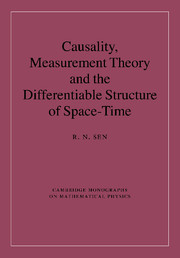Book contents
- Frontmatter
- Contents
- Preface
- Acknowledgements
- To the reader
- Prologue
- Part I Causality and differentiable structure
- Part II Geometrical points and measurement theory
- Introduction to Part II
- 6 Real numbers and classical measurements
- 7 Special topics in quantum mechanics
- 8 Von Neumann's theory of measurement
- 9 Macroscopic observables in quantum physics
- 10 Sewell's theory of measurement
- 11 Summing-up
- 12 Large quantum systems
- Epilogue
- Mathematical appendices
- List of Symbols for Part I
- References
- Index
9 - Macroscopic observables in quantum physics
Published online by Cambridge University Press: 04 August 2010
- Frontmatter
- Contents
- Preface
- Acknowledgements
- To the reader
- Prologue
- Part I Causality and differentiable structure
- Part II Geometrical points and measurement theory
- Introduction to Part II
- 6 Real numbers and classical measurements
- 7 Special topics in quantum mechanics
- 8 Von Neumann's theory of measurement
- 9 Macroscopic observables in quantum physics
- 10 Sewell's theory of measurement
- 11 Summing-up
- 12 Large quantum systems
- Epilogue
- Mathematical appendices
- List of Symbols for Part I
- References
- Index
Summary
In a certain sense, object and apparatus were essentially on the same footing in von Neumann's measurement theory. They were systems with k and l degrees of freedom respectively (page 146). There were no constraints on the numbersk and l, which could, for example, be of the same order of magnitude. Quite possibly, it was this lack of differentiation between object and apparatus that led Wigner to assert that ‘the state of the apparatus has no classical description’ (page 137), a state of affairs that produced the infinite von Neumann chain which only ended in the observer's consciousness.
In this and the following chapter we shall break with von Neumann and assume that k is small, i.e., of the order of unity, and that l is large, i.e., within a few orders of magnitude of Avogadro's number. The room for manoeuvre that this provides will allow us to break with Wigner and explore systems with states that do have classical descriptions. It will not surprise the informed reader that the room for manoeuvre created by our assumption will be filled, very substantially, by von Neumann's own work.
This chapter is divided into three sections. Section 9.1 is devoted to a theorem of von Neumann on observables that commute with each other. This prepares the way to our treatment of macroscopic observables, which is based on the commuting approximations to P and Q devised by von Neumann; these results, together with their antecedents, are presented in Section 9.2. In Section 9.3, an attempt is made to resolve some of Wigner's doubts.
Information
- Type
- Chapter
- Information
- Publisher: Cambridge University PressPrint publication year: 2010
